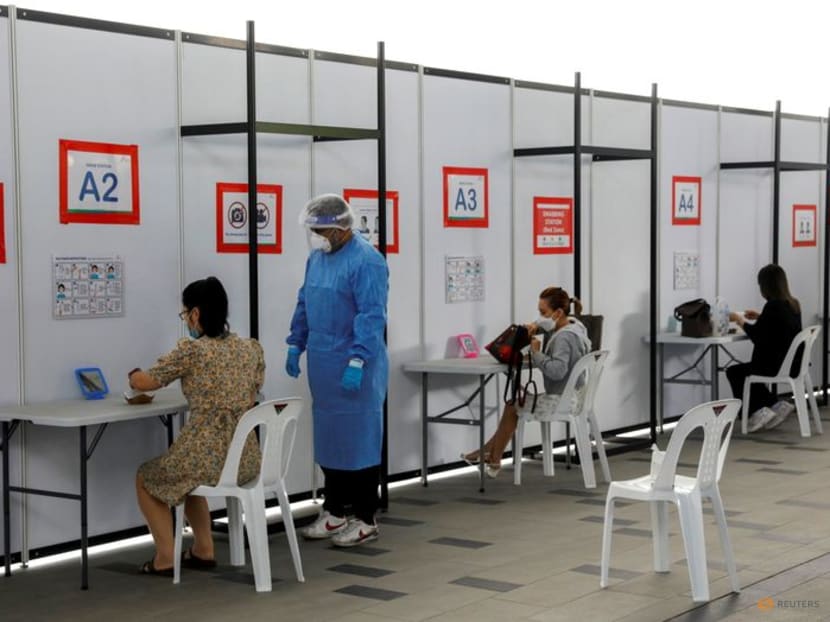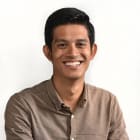Singapore tracking the emerging Omicron COVID-19 variant very closely: PM Lee

People take their antigen rapid test under supervision, at a Quick Test Centre during the coronavirus disease (COVID-19) outbreak, in Singapore on Sep 28, 2021. (Photo: REUTERS/Edgar Su)
SINGAPORE: Singapore is tracking the emerging Omicron COVID-19 variant 'very closely', and could be forced to take a few steps back again before taking more steps forward, said Prime Minister Lee Hsien Loong on Sunday (Nov 28).
Speaking at the People's Action Party (PAP) convention, Mr Lee said that Singapore has made "a lot of progress" in the fight against COVID-19, but must be prepared for more bumps along the way.
"Right now, a new variant of concern is emerging. We've learnt a new word – the Omicron variant. We are tracking this very closely. We are not sure yet, but we may well be forced to take a few steps back, before we can take more steps forward," said Mr Lee.
"But despite all this, I am confident that we will find our way to living with the virus, and safely resume all the things we love to do. We are making all this effort because we want to get there safely, suffering as few casualties along the way as possible."
The Omicron variant has been designated "of concern" by the World Health Organisation, with countries imposing travel curbs on travellers from a number of African countries.
On Friday, Singapore also said it will restrict entry to travellers with recent travel history to seven African countries following the emergence of the variant in that region.
All long-term pass holders and short-term visitors with travel history within the previous 14 days to Botswana, Eswatini, Lesotho, Mozambique, Namibia, South Africa and Zimbabwe are not allowed to enter Singapore or transit here.
A "SEARCHING TEST OF PUBLIC TRUST"
Mr Lee also noted that COVID-19 has been a "searching test" of public trust, and this applies to countries all around the world.
"Some societies are high-trust, others are low-trust – and it makes all the difference in a crisis. Singapore is and must always be high-trust."
"That is the way to weather not just COVID-19, but any storm that comes our way."
Mr Lee gave the example of countries that have had great difficulty vaccinating their whole population, despite vaccines being available. He pointed out that "political divisions and deep distrust" have made it harder for the US and many European countries to bring COVID-19 under control.
"Many of them are anti-vaxxers - not just because they are misguided or ignorant, but because of deep distrust – of authority in general, and of their own government in particular," he added.
He noted that Singapore is fortunate not to have such divisions in its society.
"We did not become a cohesive, trusting society overnight. Social cohesion is the work of decades. And trust has to be built up long before the crisis. When a crisis strikes, if the trust is not already there, then it is already too late," said Mr Lee.
"I am grateful that the PAP government enjoys the public’s trust, built up over years of working closely with Singaporeans. We've been delivering faithfully on promises. Consistently producing results for the people – housing, healthcare, education, well-paying jobs, better lives. We have shown year in, year out, in good times and bad, in crisis after crisis, that the PAP government will always be there - with you, for you, for Singapore."
During the COVID-19 crisis, the Government needed to draw on this "reservoir of trust", as it faced many difficult and urgent decisions impacting lives and livelihoods, said Mr Lee.
"Whatever we decide, however hard we try to get it right and to cushion the impact, more often than not some group or other will be affected or disappointed," he added.
"Yet still the Government must exercise its judgment to the best of its ability, and carry Singaporeans along."
Mr Lee noted that in a crisis, leaders cannot afford to waver.
And as leaders strive to do the right thing, they must continue nurturing the people’s trust, he added. This means dealing competently with the problems, explaining clearly what they are doing and why, as well as where they are headed as well as being open and transparent.
It is also important to lead by example, he pointed out.
"In Singapore we take this for granted, but it is very important and worth reminding ourselves. The same rules apply to everybody – safe distancing, mask wearing, testing and isolation requirements," Mr Lee said.
"You may be Minister or MP, community leader or safe distancing ambassador – you abide by the same rules, whoever you may be."
Trust is important not just between Singaporeans and the leaders, but between each other too, said Mr Lee. And while rules and penalties are necessary, they are not enough, he explained.
"We must also trust our collective spirit as one people. Looking out for one another, supporting those in greater need, staying united in a crisis," Mr Lee added.
"Singapore cannot claim to have better doctors or scientists, or better healthcare than the US or Europe. But the decisive difference in our response is this: We trust one another, and therefore we work with one another and not against one another."





